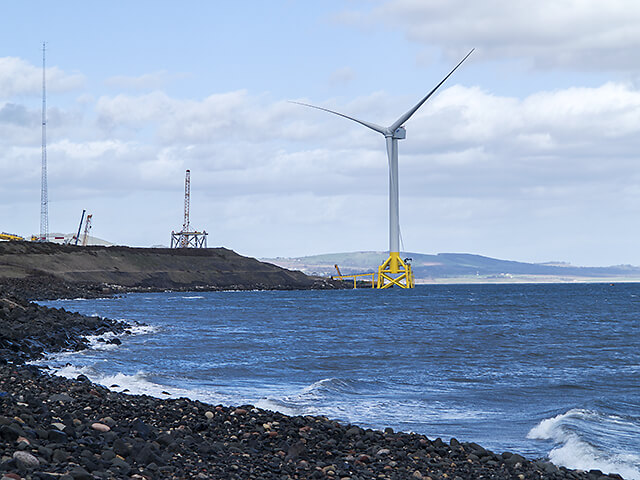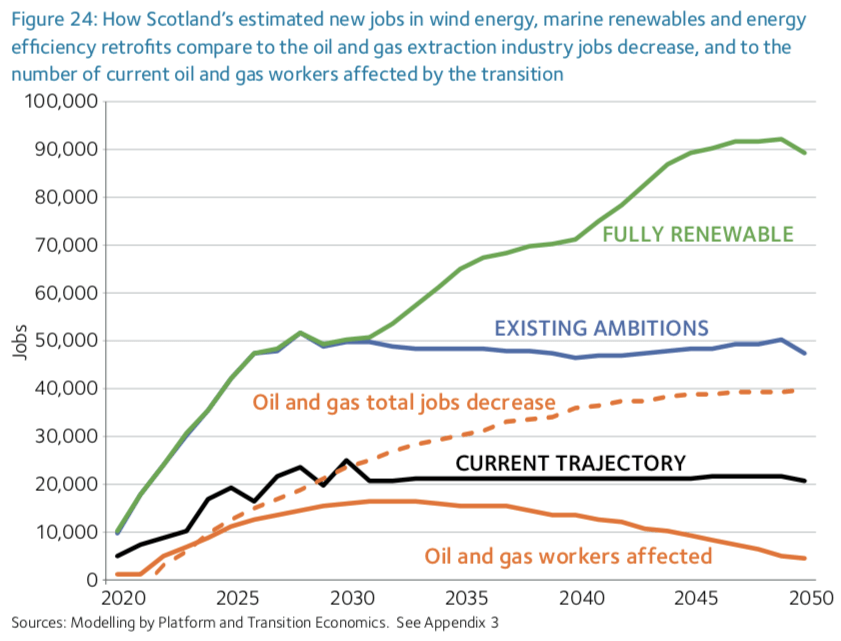This blog is a version of our presentation of the report Sea Change: Climate Emergency, Jobs, and Managing the Phase-Out of UK Oil and Gas Extraction, at its launch event in Edinburgh on 11 September 2019. An abridged version has appeared in the Herald on Sunday.
We know that tackling the climate emergency means quickly scaling back the amount of oil, gas and coal that we take out of the ground and burn. This means oil-extracting countries have a choice: Option A: start scaling back the drilling now, in a gradual way, with time to build up alternative industries and take care of the communities that depend on oil now. Option B: wait until later and face a much quicker, chaotic shutdown. I know which option I’d choose, but what does it look like?
Scotland’s potential for clean energy industries is huge, with an estimated 46GW viable fixed offshore wind resource (with only 5 GW already planned), and an even bigger potential for floating offshore windfarms (over 120 GW), not to mention pioneering centres for tidal and wave energy. And offshore renewable energy is a viable pathway for firms and workers in the oil and gas supply chains. Many Scottish specialist scaffolding and construction firms as well as marine crews already work interchangeably on oil rigs and offshore windfarms. Other oil and gas supply companies will find applications in advanced water or waste treatment and innovative heat networks, according to research by Arup. Undoubtedly, workers and supply chain firms need support and guarantees to make the leap from old industries to new securely.
Two big questions remain. First, can there be enough jobs in the clean energy economy?

We modelled how many jobs could be created over time in some of the most compatible clean energy industries – wind, wave, tidal, and energy efficiency retrofits – in three possible futures (see graph below). In the first future, neither the Scottish nor UK governments do anything else to help the industries grow. In this case, the number of jobs in wind energy is similar to the number of oil and gas workers potentially affected by the transition, but nowhere near enough to actually replace oil and gas employment.
But in the second future, if Scotland and the rest of the UK build as many new windfarms and tidal and wave energy generators as industry and politicians currently say is possible to aim for, and retrofit their housing stock to boot, over three new clean energy jobs can be created per oil worker affected. And in the third, ‘fully renewable’ future (i.e. enough clean energy sources to fully replace oil and gas), job creation over the next three decades is even greater.

So it’s possible to fully replace the economic contribution of the oil and gas industry by betting on renewable energy – if government does its job right. This brings me to the second question: how to make sure jobs appear in the places where they’re needed, and are secure, well-paid, and unionised?
Let’s face it, the offshore wind industry at the moment has a patchy track record as an employer. Hundreds of workers at two construction yards in Fife were left without contracts that EDF Energy promised them (look up the Ready for Renewal campaign if you haven’t heard of it). On the other hand, the Siemens wind turbine blade factory in Hull has provided over 500 stable unionised jobs since 2016.
There’s a lot governments can do to make sure that the transition creates enough good jobs (more like the latter example, less like the former). In countries from France to Taiwan, governments impose conditions on energy companies bidding for contracts to create manufacturing jobs locally. In Germany and Canada, national investment banks work to help new industries set up – exactly the job that the Scottish National Investment Bank could be taking on, and a useful instrument to influence the industry by setting requirements on job conditions, pay and union recognition. Over on STUC’s blog, Francis Stuart suggests several other tools the Scottish government could use.
That’s why we need our governments to change direction, and fast. Instead of doing everything they can to keep the oil industry clinging on, they can make sure that the clean jobs of the future arrive, and are good, fulfilling, secure jobs.